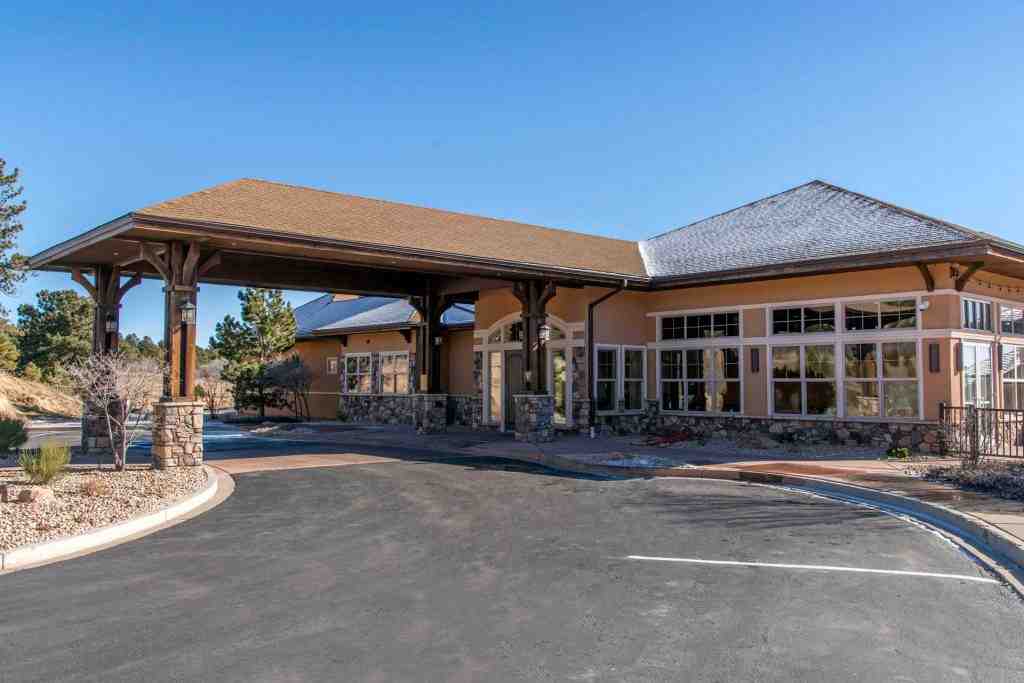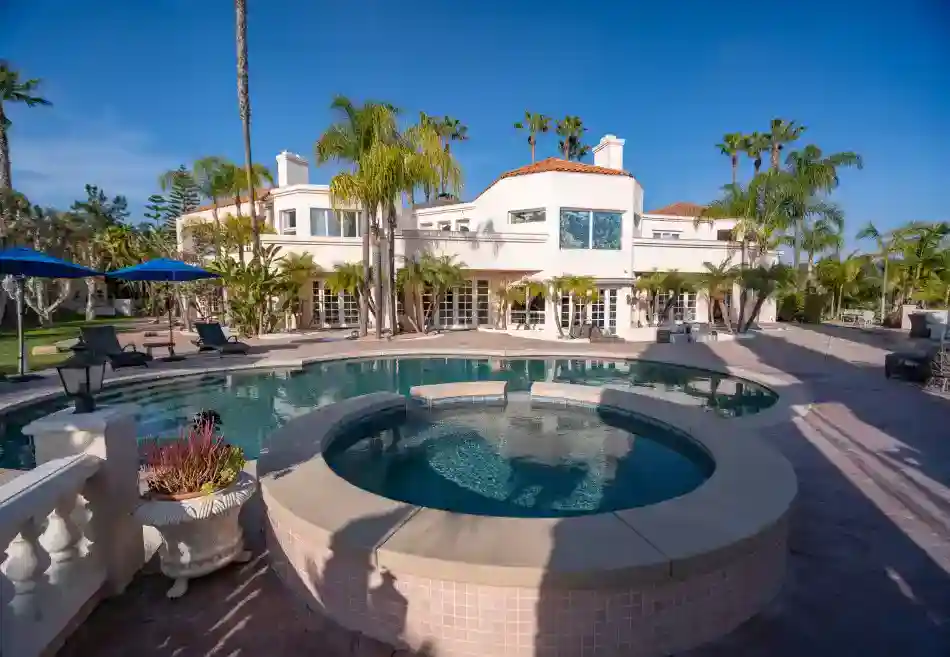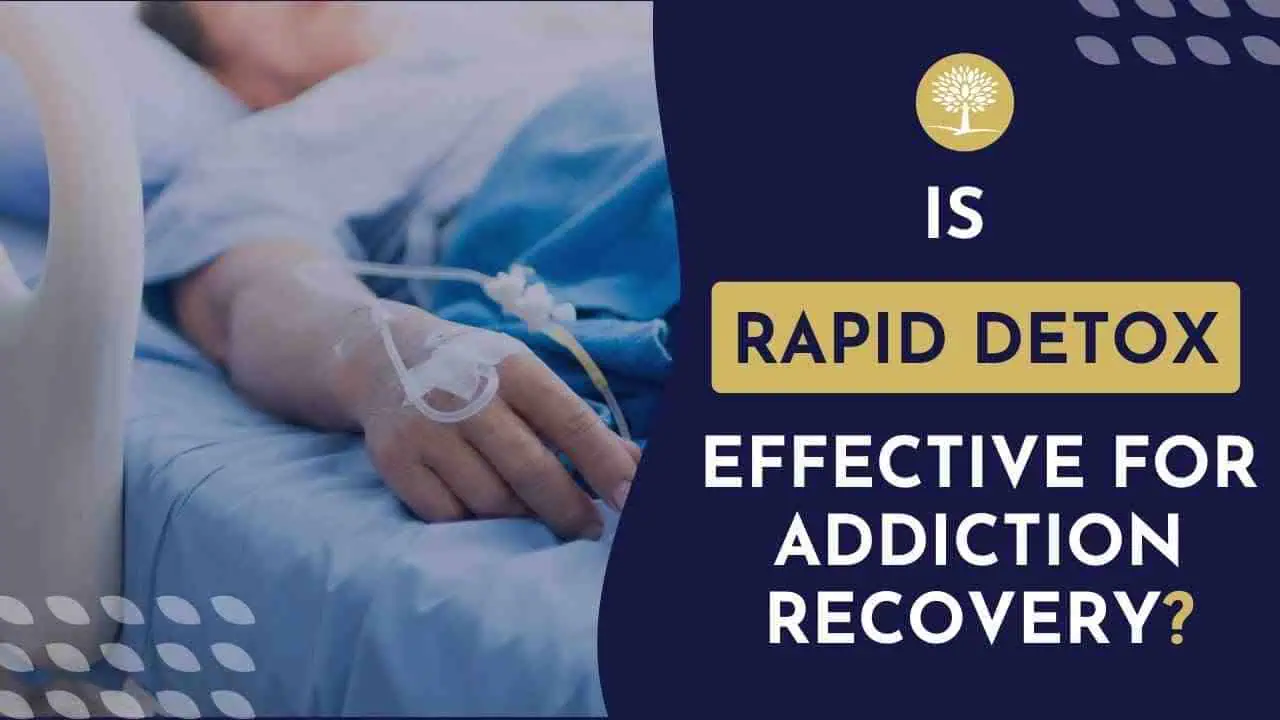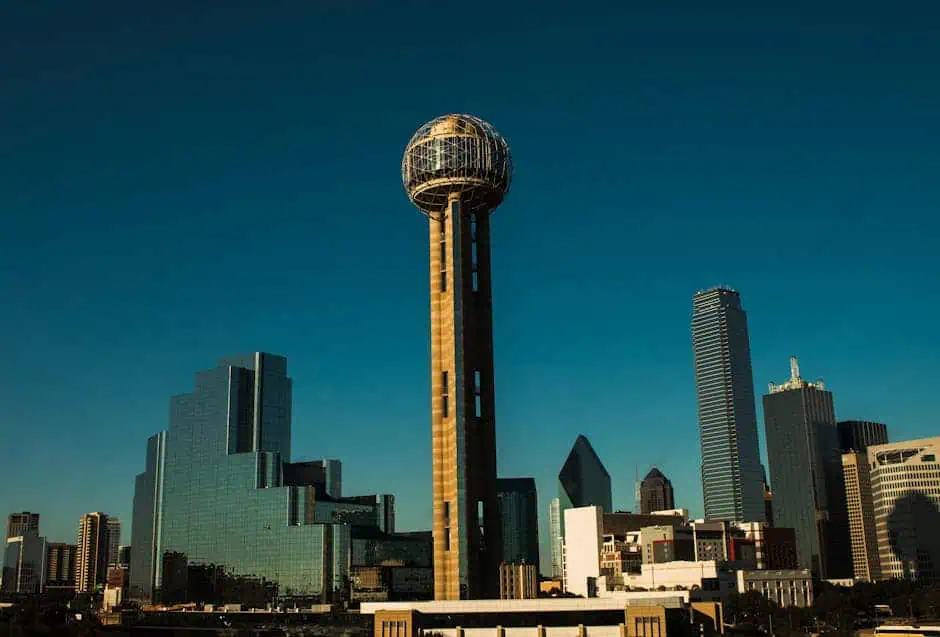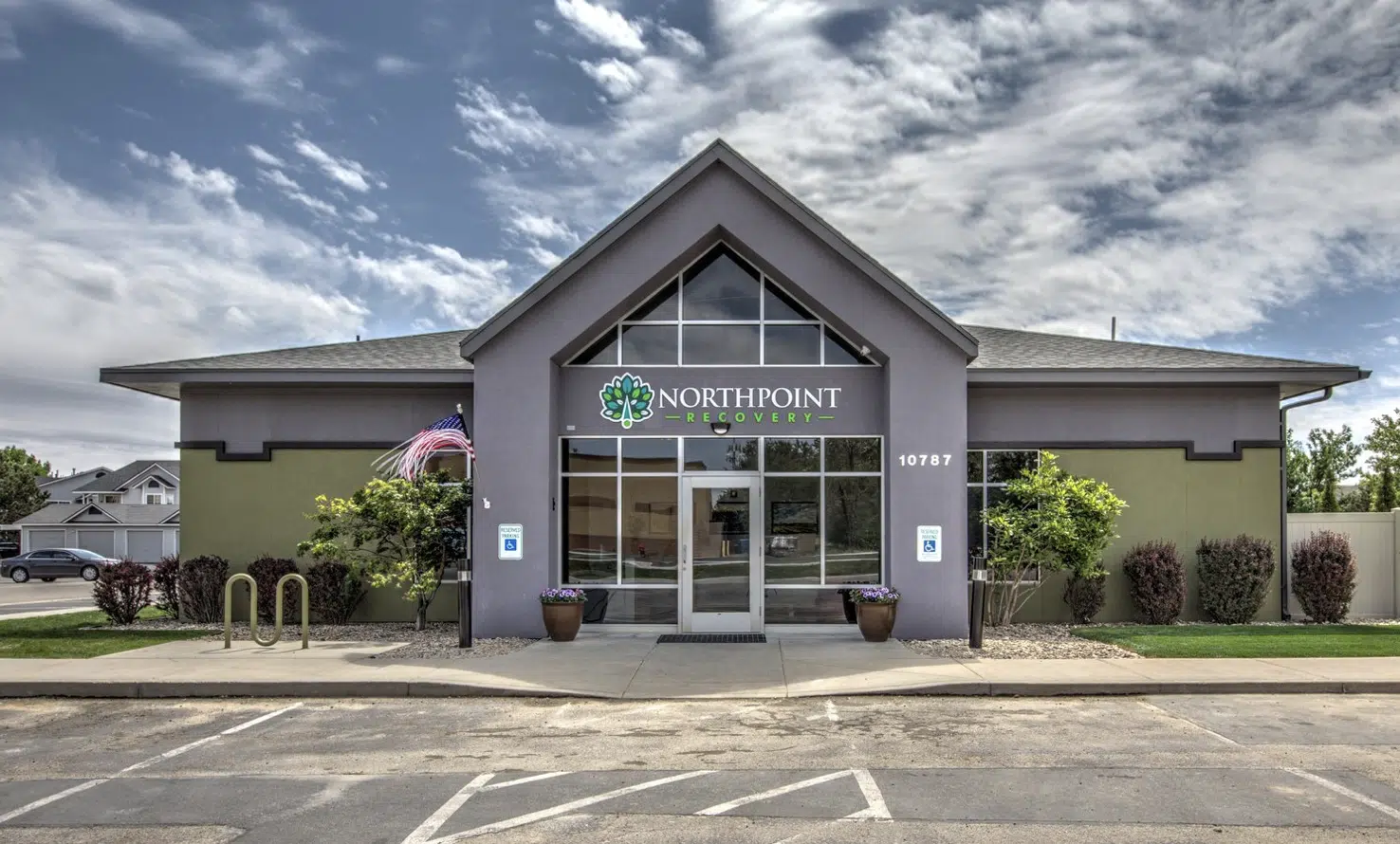
Finding Hope and Healing in the Evergreen State
Treatment centers Washington offer comprehensive addiction recovery services across the state, from medical detox and inpatient care to outpatient programs and sober living. If you or someone you love is struggling with substance use, here’s what you need to know:
Quick Answer: Washington has 77 licensed rehab facilities offering:
- Medical Detox – Supervised withdrawal management (24-48 hour initial stabilization)
- Inpatient/Residential – 28-90+ day programs with 24/7 care
- Outpatient Programs – PHP, IOP, and OP allowing you to live at home
- Dual Diagnosis Treatment – Addressing mental health and addiction together
- Insurance Coverage – Most centers accept private insurance, Medicaid, and offer sliding scale fees
Approximately 8.6% of Washington residents aged 12 and older struggle with substance use disorders. That’s roughly 523,000 people seeking help in the Evergreen State. The good news? Washington offers diverse treatment options from the coast to Spokane, many clustered around Seattle and Tacoma.
Choosing the right center is crucial. Research indicates that structured inpatient programs often lead to lower relapse rates. Facilities offering a continuum of care—allowing you to move from detox to residential to outpatient care in one place—are especially beneficial, as they help you build lasting relationships with therapists and peers.
This guide reviews the top 10 treatment centers in Washington, breaking down what makes each unique, what services they offer, and who they serve best. We’ll also cover insurance coverage, costs, and how to verify your benefits.
At Addiction Helpline America, we help individuals and families steer the process of finding addiction treatment. We connect people with quality treatment centers Washington offers, providing confidential, compassionate guidance 24/7.
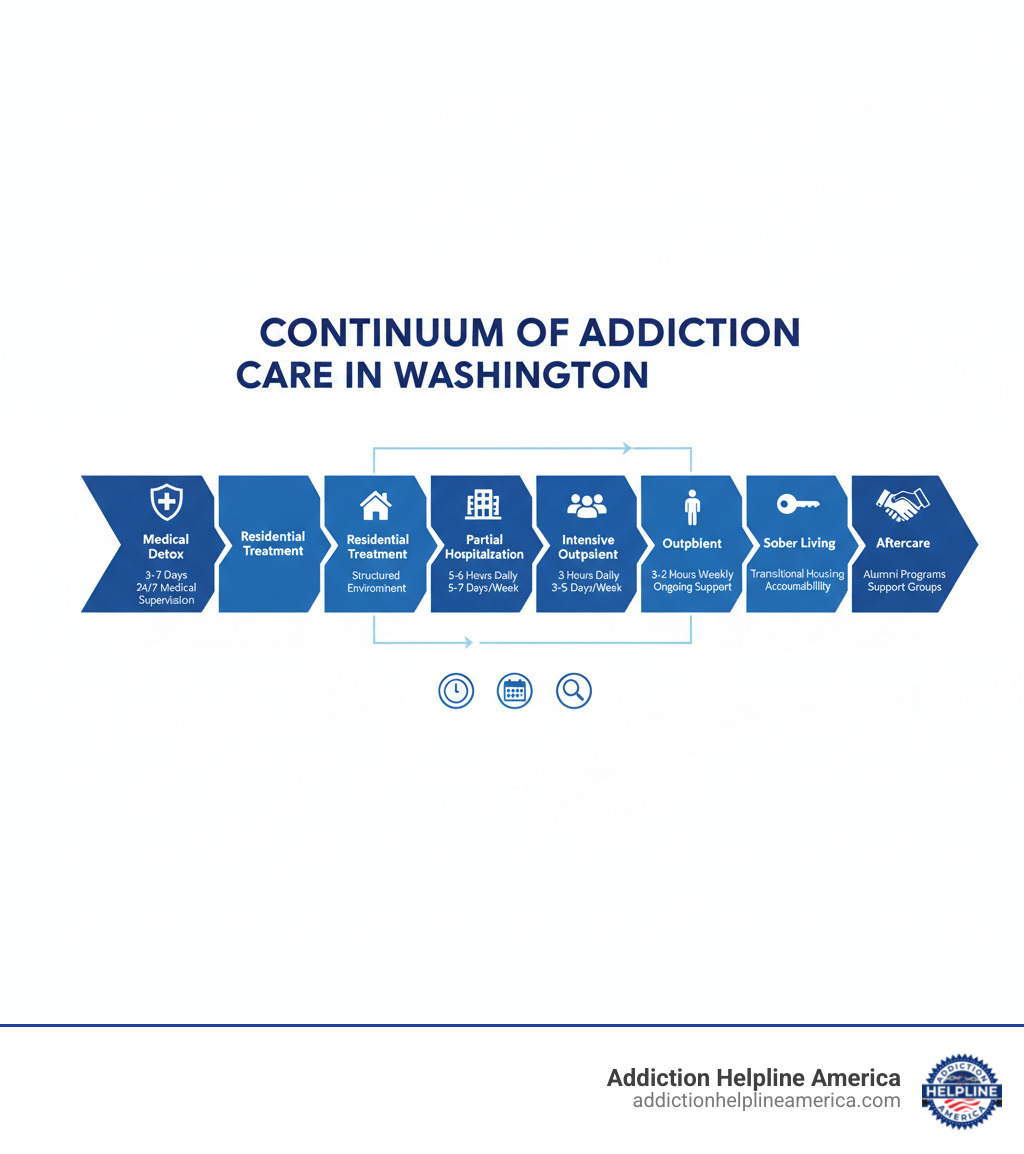
Quick Treatment centers Washington terms:
Understanding the Levels of Addiction Care Available
When you’re ready to seek help, the treatment landscape can feel overwhelming. The good news is that addiction treatment isn’t one-size-fits-all. Treatment centers Washington offers operate on a continuum of care, with different levels of intensity to meet you where you are in your recovery journey.
Think of it like climbing stairs. Some people need to start with intensive support, while others might step in at a higher level. As you get stronger, you can move to less intensive care while still getting the support you need.
Often the first step, medical detox provides 24/7 medical supervision to safely manage withdrawal symptoms. For substances like alcohol or benzodiazepines, this is critical for safety. Detox typically lasts 3-7 days, stabilizing you physically to prepare for further treatment.
After detox, many enter residential or inpatient treatment, the most intensive level of care. You live at the facility for 28, 60, or 90+ days in a structured, trigger-free environment. The 24/7 support and immersion in therapy, counseling, and life skills training significantly lower relapse risk, making it ideal for moderate to severe addiction.
Partial Hospitalization Programs (PHP) are a step down, offering intensive treatment for 5-6 hours a day, 5-7 days a week, while you live at home or in sober living. It’s ideal for those needing structure without 24/7 residential care.
Call Now – Your Journey to Recovery Begins Today!

Take the first step towards a healthier life! Call now to connect with our compassionate team and start your recovery journey today. Your path to healing awaits!
Our recovery specialists are available 24/7 to provide support, and all calls are confidential and free. Reach out anytime – we’re here to help!
Intensive Outpatient Programs (IOP) offer more flexibility, with sessions for about 3 hours a day, 3-5 days a week. This allows you to manage work or family life while receiving robust support focused on relapse prevention and coping skills.
Outpatient programs (OP) are the least intensive, with 1-2 hours of therapy per week. This level is best for ongoing support after completing a higher level of care or for individuals with less severe substance use issues.
Sober living homes are substance-free residences that provide a supportive, structured bridge back to independent living. They offer peer support and accountability as you practice recovery skills in a real-world setting.
Finally, aftercare is the long-term support that sustains recovery. It includes alumni programs, support groups (like AA or NA), and ongoing therapy to keep you connected and accountable for years to come.
Choosing between inpatient and outpatient care depends on the severity of your addiction, your home environment, and your daily responsibilities. Inpatient offers an immersive, protected environment, while outpatient provides flexibility for those with a stable support system.
| Feature | Inpatient/Residential Treatment | Outpatient Treatment (PHP, IOP, OP) |
|---|---|---|
| Setting | Live at the facility, 24/7 care | Live at home, attend sessions during the day/week |
| Intensity | Highly structured, immersive, intensive | Structured sessions, more flexibility |
| Supervision | Constant medical and therapeutic supervision | Regular therapeutic contact, less constant supervision |
| Duration | Typically 28, 60, 90+ days | Varies; PHP (weeks-months), IOP (months), OP (ongoing) |
| Ideal For | Severe addiction, co-occurring disorders, unstable home life | Moderate addiction, stable home life, work/school commitments |
| Relapse Risk | Generally lower due to structured environment | Higher without strong support system and commitment |
| Cost | Generally higher | Generally lower |
The beautiful thing about Washington’s treatment landscape is that many centers offer multiple levels of care under one roof. This means you can step down from inpatient to PHP to IOP without changing facilities—keeping the same therapists and peers who understand your story.
Ready to explore your options? Check out Washington Rehab Centers to see what’s available in your area. We’re here to help you find the right level of care for your unique situation.
A Closer Look: Top 10 Treatment Centers in Washington
Finding the right treatment centers Washington offers can feel overwhelming. That’s why we’ve researched and compiled this list of ten exceptional facilities across the state. Each brings something unique, whether it’s a specific philosophy, a healing location, or specialized programs.
1. Royal Life Centers (Multiple Locations)
With the motto “Because We Care,” Royal Life Centers has provided guest-centric care since 2009 in Lacey, Sumner, Spokane, and Mead. Their standout feature is a full continuum of care, allowing clients to move from detox to sober living within the same system. They use a biopsychosocial/spiritual model to treat the whole person, blending evidence-based and holistic therapies. Accredited by The Joint Commission, they offer 24/7 support and custom treatment plans, ensuring you’re treated with compassion at every step.
Learn more about their Washington locations: Royal Life Centers at The Haven, Royal Life Centers at Sound Recovery, and Pathways Mental Health Services Lacey, WA.
2. Northpoint Washington (Edmonds & Seattle)
Northpoint Washington serves the Puget Sound area with detox/inpatient services in Edmonds and outpatient in Seattle. Their key strength is an integrated dual diagnosis focus, addressing addiction and co-occurring mental health issues like depression or anxiety simultaneously. Their 28-day inpatient program provides a structured environment using therapies like CBT and family counseling to address the root causes of addiction. With high success rates and a growing alumni program, they offer lasting support.
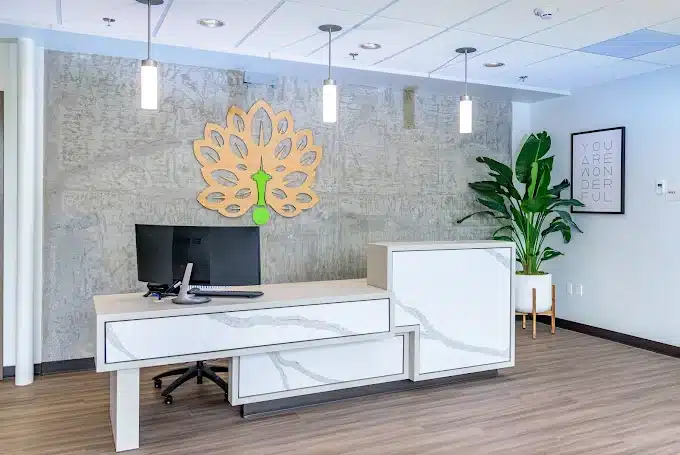
Explore more treatment centers Washington residents trust at Seattle, WA Rehab Centers.
3. Free by the Sea (Ocean Park)
Located on Washington’s coast in Ocean Park, Free by the Sea uses its naturally therapeutic setting to aid healing. Specializing in inpatient treatment, the facility provides a structured, immersive environment away from daily triggers, which typically leads to lower relapse rates. Their programs integrate 12-step principles with evidence-based therapies and offer extended stays (60-90+ days), recognizing that recovery takes time. Each client receives a personalized plan to address their unique needs.
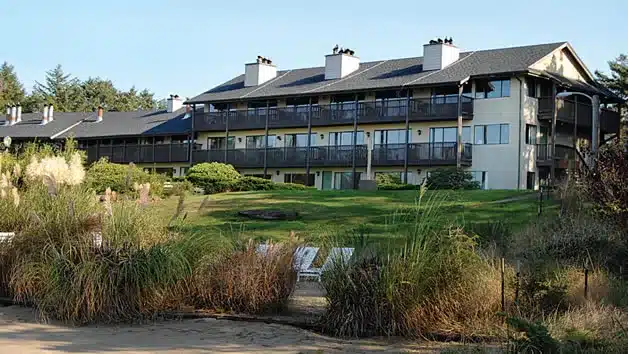
Learn more at Free by the Sea Ocean Park, WA.
4. The Clearing (Friday Harbor)
Nestled in the San Juan Islands, The Clearing is an alternative program offering holistic healing in a breathtaking setting. It focuses on dual diagnosis treatment in a small group setting, creating an intimate and supportive community. The island location provides a peaceful disconnect from mainland stressors, allowing for deep inner work. The Clearing’s holistic approach addresses the physical, emotional, and spiritual aspects of addiction, making it ideal for those seeking a different path to recovery.
If you’re drawn to a more alternative, intimate approach to recovery, explore The Clearing Friday Harbor, WA.
5. Hazelden Betty Ford (Bellevue)
As a renowned national provider, Hazelden Betty Ford’s Bellevue center brings decades of expertise to Washington. Their evidence-based model seamlessly integrates addiction and mental health treatment. A unique emphasis on family programs helps repair relationships and build a strong support system for recovery. They offer multiple levels of care, including virtual services, making their expert treatment widely accessible.
Find more at Hazelden Betty Ford Bellevue, WA.
6. The Recovery Village Ridgefield
The Recovery Village Ridgefield offers a full continuum of care with highly personalized treatment plans. Beginning with medical detox, clients can transition through residential and outpatient programs within one system. A key distinction is their focus on trauma-informed care, addressing underlying pain that often fuels addiction. The scenic Ridgefield setting provides a peaceful backdrop for healing from substance use and co-occurring mental health conditions.
Find comprehensive care at The Recovery Village Ridgefield, WA.
7. Lakeside-Milam Recovery Centers (Kirkland & other locations)
As a long-standing provider with deep roots in the community, Lakeside-Milam has served Washington residents for decades. With locations like Kirkland, they offer both inpatient and outpatient options. Hallmarks of their program include strong family involvement and a medically-managed detox to ensure a safe start to treatment. Their proven expertise combines various therapies to help clients build skills for long-term sobriety.
Explore local options at Kirkland, WA Rehab Centers.
8. Olalla Recovery Centers (Olalla)
Olalla Recovery Centers provides a rural, serene setting for those needing to step away from the chaos of addiction. Their holistic approach treats the whole person, and they offer gender-specific programs to address the unique needs of men and women in recovery. The tranquil, nature-focused environment supports deep introspection and growth, helping clients build a strong foundation for sobriety.
If you’re drawn to a more intimate, nature-centered approach to recovery, learn more at Olalla Recovery Centers, WA.
9. Schick Shadel Hospital (Seattle)
Located in Seattle, Schick Shadel Hospital offers a distinct medical approach to addiction treatment. As a hospital facility, they specialize in aversion therapy (medical counter-conditioning) in a short-term, intensive program. Treatment is medically supervised from detox onward, aiming to create a negative association with substances. This unique, medically-driven intervention is particularly effective for some individuals, especially those with alcohol dependence.
Learn more about Schick Shadel Hospital Seattle, WA.
10. John Volken Academy (Seattle)
John Volken Academy in Seattle offers a long-term residential program for those seeking a complete life change, typically lasting one to two years. Using a therapeutic community model, the program integrates life skills training and vocational development. As a social enterprise, it fosters community and responsibility, preparing residents for success beyond sobriety. It’s ideal for those wanting a total personal overhaul.
Find more about John Volken Academy Seattle, WA.
Call Now – Your Journey to Recovery Begins Today!

Take the first step towards a healthier life! Call now to connect with our compassionate team and start your recovery journey today. Your path to healing awaits!
Our recovery specialists are available 24/7 to provide support, and all calls are confidential and free. Reach out anytime – we’re here to help!
Paying for Rehab: Insurance and Costs in Washington
One of the biggest barriers to seeking help is the question: “Can I afford this?” Fortunately, recovery is more accessible than many people think.
Thanks to the Affordable Care Act (ACA), most private and employer-sponsored health insurance plans are required to cover substance use disorder treatment. This means if you have health insurance, a significant portion of your rehab costs will likely be covered.
When we looked at treatment centers Washington has to offer, we found that the vast majority work with major insurance providers. There are 50 rehabs in Washington that accept BlueCross BlueShield, 49 that accept Cigna, and 49 that accept United Healthcare. These numbers represent real options for people who thought treatment was financially out of reach.
If you don’t have private insurance, don’t lose hope. Washington State offers Apple Health (Medicaid), which covers substance use disorder treatment. If you’re enrolled, you’re covered. You can contact a treatment facility directly without needing a referral from a managed care plan. If you’re not sure whether you qualify, you can check your eligibility and apply through the Washington Healthplanfinder website.
Beyond insurance, many facilities understand that everyone’s financial situation is different. About 56% of rehabs in Washington offer sliding-scale fees, adjusting the cost based on your income. Even more encouraging, roughly 40% of treatment centers provide free or minimal-cost treatment, often supported by state funding. Nearly two-thirds of facilities accept state-funded insurance, showing a commitment to making recovery available to everyone.
Verifying your benefits is a critical step before starting treatment. Most treatment centers Washington operates, including those we work with at Addiction Helpline America, offer a free, confidential service to help you understand your insurance coverage. This process clarifies what’s included, what your out-of-pocket costs might be, and which services your policy will pay for. There are no surprises—just clarity.
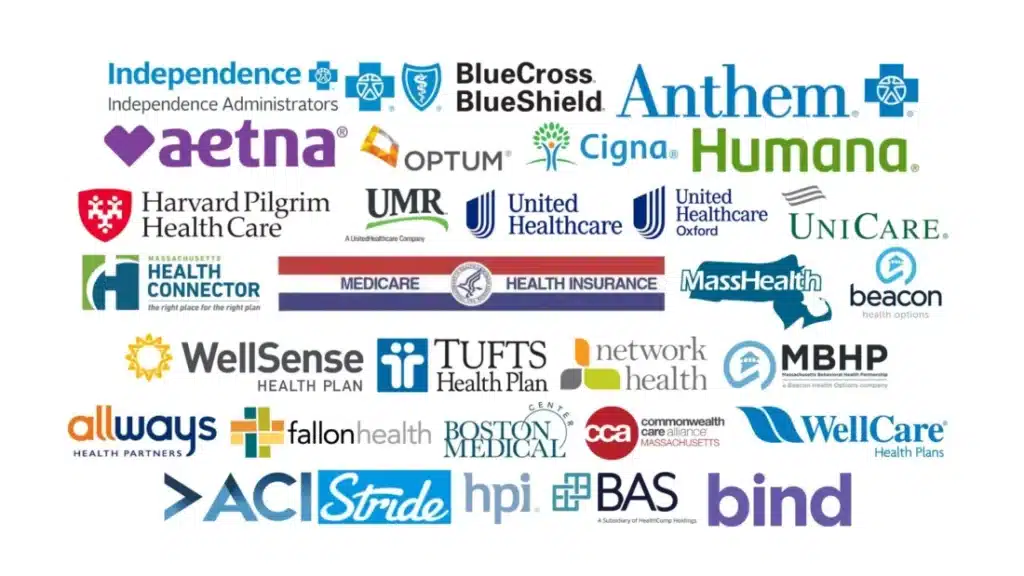
The bottom line is that cost should not be a barrier to getting help. With 77 rehabs across Washington, options like insurance, Medicaid, sliding-scale fees, and low-cost programs create a path forward for nearly everyone. We can help you steer these financial questions confidentially and at no cost.
Frequently Asked Questions About Treatment Centers in Washington
When you’re searching for help, it’s normal to have questions. We’ve been working with individuals and families across Washington for years, and these are the questions we hear most often. Let’s walk through them together.
What is dual diagnosis and why is it important?
Dual diagnosis or co-occurring disorders refers to having both a substance use disorder and a mental health condition, which affects about 50% of people with addiction. Often, one condition fuels the other, creating a difficult cycle. For example, someone might drink to quiet anxiety, but the alcohol eventually worsens it.
Integrated treatment is crucial because it addresses both issues simultaneously. Treating only the substance use while ignoring underlying depression, anxiety, or PTSD is like putting a bandage on a wound that needs stitches. Effective treatment centers weave mental health care into their addiction programs, providing tools to manage both challenges for lasting recovery. For more information, the National Institute of Mental Health offers helpful statistics on co-occurring disorders.
How do I find specialized treatment centers in Washington?
Different people need different kinds of support, and Washington offers specialized programs designed for specific populations and needs.
- Teen programs understand adolescent development and integrate educational support.
- LGBTQ+ affirming care creates safe environments that address unique challenges like minority stress and identity-related trauma.
- Veterans programs are custom to address combat-related trauma and PTSD in a setting with others who understand military culture.
- Gender-specific treatment (men-only or women-only) can create a safer space for vulnerability and sharing.
Finding the right specialized program can feel difficult, but help is available. An addiction specialist can help you identify facilities that are equipped to handle your specific circumstances and guide you to the best fit.
What accreditations should I look for in a treatment center?
Accreditations are your assurance that a facility meets rigorous professional standards. Here are the key ones to look for:
- The Joint Commission: This is the gold standard in healthcare accreditation, signifying that a facility meets the highest standards for patient safety and quality of care.
- CARF International (Commission on Accreditation of Rehabilitation Facilities): This accreditation shows a facility’s commitment to quality and meeting internationally recognized standards for rehabilitation services.
- LegitScript Certification: This certification ensures a provider operates legally and ethically, protecting you from fraudulent practices, especially when researching options online.
- State licensing through the Department of Health (DOH): This is a non-negotiable license from the Washington DOH, confirming a facility meets state-mandated standards for safety and operation. Behavioral Health Agencies can be certified to provide mental health, substance use disorder, and problem gambling services.
These credentials represent a commitment to your safety, dignity, and recovery. Reputable facilities are proud to share this information.
Call Now – Your Journey to Recovery Begins Today!

Take the first step towards a healthier life! Call now to connect with our compassionate team and start your recovery journey today. Your path to healing awaits!
Our recovery specialists are available 24/7 to provide support, and all calls are confidential and free. Reach out anytime – we’re here to help!
Your Next Step Towards Recovery
If you’ve made it this far, you’re already taking a brave step. Reading about treatment centers Washington offers, understanding your options, and considering recovery—that’s courage in action. We know that reaching out for help can feel overwhelming. Maybe you’re worried about what comes next, or perhaps you’ve tried before and it didn’t work out. Those feelings are completely normal.
Here’s what we want you to know: recovery is possible, and you don’t have to figure this out alone.
At Addiction Helpline America, we’ve walked alongside thousands of individuals and families through this exact moment. We understand the questions swirling in your mind: Which program is right for me? Can I afford treatment? What if I need to work while getting help? What about my family?
Our team provides free, confidential, and personalized guidance to help you find the right fit from the vast network of quality treatment centers Washington has available—and across the entire nation. We’re not here to push you toward any particular facility. Instead, we listen to your unique situation, your concerns, and your goals, then connect you with programs that truly match your needs.
We’re available 24 hours a day, 7 days a week. Whether it’s 3 PM or 3 AM, whether you’re ready to start tomorrow or just exploring options, we’re here. Our support specialists will help you verify your insurance benefits at no cost, answer your questions about different levels of care, and walk you through what to expect from the admission process.
You’ve already shown incredible strength by seeking information. Now, let’s turn that knowledge into action. Your journey toward healing, happiness, and health can begin right now—with a single phone call or click.
Find the right rehab for you today—because taking the first step is the most important one you’ll ever take.
Our helpline is 100%
free & confidential
If you or someone you care about is struggling with drug or alcohol addiction, we can help you explore your recovery options. Don’t face this challenge alone—seek support from us.
Programs
Resources
Will my insurance
cover addiction
treatment?
We're ready to help
Find the best
drug or alcohol treatment
center
Are you or a loved one struggling with addiction? Call today to speak to a treatment expert.





